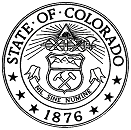![]() The information on this page is archived and provided for reference purposes only. It may be outdated or no longer maintained.
The information on this page is archived and provided for reference purposes only. It may be outdated or no longer maintained.
Military Absentee Voting Bill Gutted in Conference Committee
Coffman Urges Lawmakers to Reject Conference Report and Restore Bill’s Former Language to Aid Soldiers and Marines in Combat
Denver, April 19, 2007 – Secretary of State Mike Coffman expressed deep disappointment today that a bill to assist soldiers and Marines obtain absentee ballots while serving in a combat zone was severely weakened by a compromise forced by Senate President Joan Fitz-Gerald.
HB07-1149, the Military and Overseas Absentee Voting Bill, creates a narrow exception for military personnel who are serving overseas in a combat zone. The bill was originally written to allow a soldier or Marine in a combat zone to verbally request that a commissioned officer or voting assistance officer apply for an absentee ballot on their behalf. This legislation is needed because many soldiers and Marines serve in remote forward operating bases, where communications and mail are limited.
The bill was changed to require the soldier or Marine to provide a written statement to the commissioned officer or voting assistance officer before the absentee ballot application could be requested. The change, led by Senator Fitz-Gerald, occurred in a conference committee yesterday.
“The basis of this legislation was to help soldiers and Marines out in the forward operating bases serving in Iraq and Afghanistan,” Coffman said. “Requiring a signed document defeats the purpose of this legislation; if they are required to send a written statement, they might as well complete the absentee ballot application on their own. But the point is that many times that is impossible.”
The legislation stemmed from Coffman’s personal experience in Iraq in 2005, when he was unable to vote in the Colorado November election. Coffman worked with Representative Joe Rice (D-Littleton) and Senator Steve Ward (R-Littleton), veterans of Iraq and Afghanistan respectively, on the legislation.
“Joe Rice and Steve Ward have been tremendous to work with, and I salute them. The fact that this bill has been severely weakened is not a reflection of their hard work and dedication to the soldiers and Marines serving in our military,” Coffman said.
In January 2006, after he finished working on elections, Coffman went to the Western Euphrates River Valley to help establish interim local governments, where he rotated between several forward operating bases that were located inside of rural agricultural towns along the river valley.
According to Coffman, everything moved by combat convoy. Patrolling inside of the towns was routine and constant, but movement from forward operating bases to the larger, more secure base camps was kept to a minimum to reduce the risk of attack. The movement of signed documents so soldiers and Marines could apply for an absentee ballot would justifiably not be a priority, regardless of how close it was to an election back home.
Coffman crafted the legislation specifically to help the soldiers and Marines serving in these remote forward operating bases. Under the original legislation, a list of names could be forwarded up the chain of command (via field radio from the forward operating bases) until it reached one of the larger base camps that has established communications and more regular mail service.
“Requiring a signature, even if it’s on the back of an MRE box, defeats the entire purpose of this legislation,” said Coffman
Coffman strongly urges lawmakers to reject the conference report with the diluted version of HB07-1149, so the conference committee can once again review the legislation. The House of Representatives is scheduled to debate the conference report today.
“It would now be disingenuous to claim that this bill does something of value for the soldiers and Marines serving on the front lines in Iraq and Afghanistan. This gutted version of the bill does nothing of substance.”




 Menu
Menu  Search
Search 
